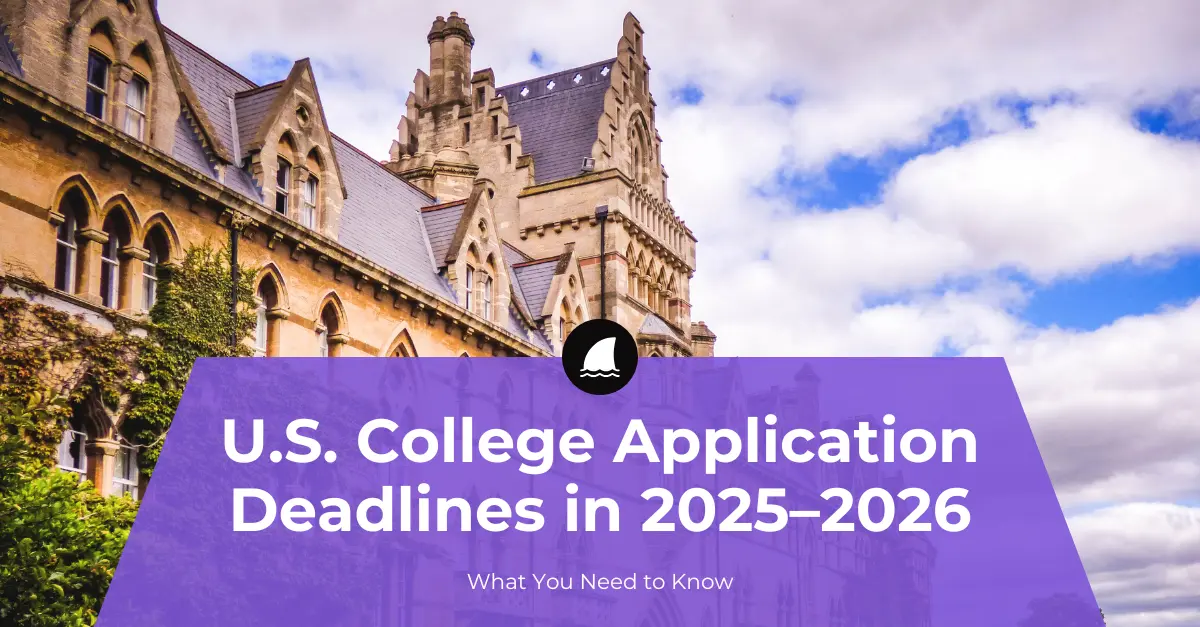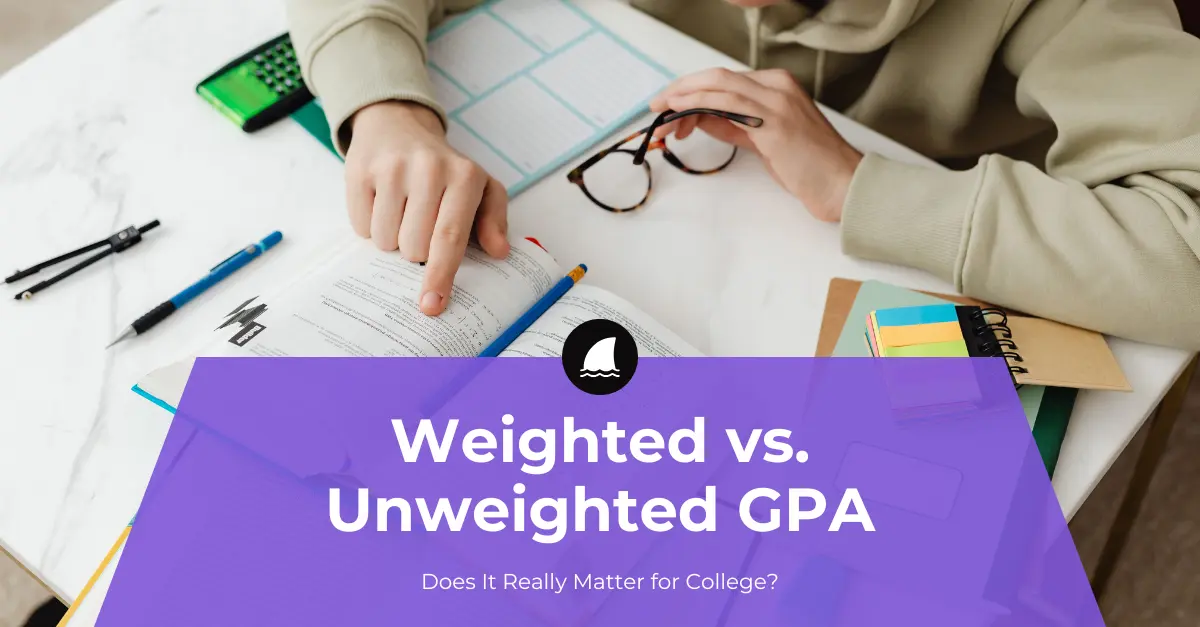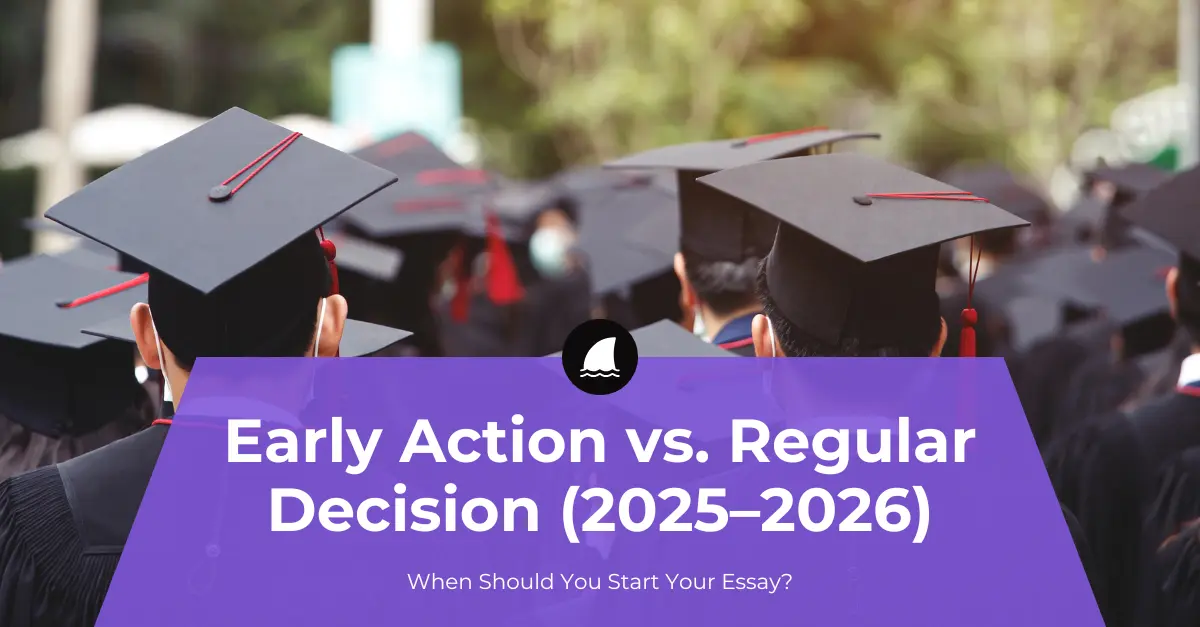
It’s such a pity to miss the opportunity to enroll in your dream school just because you fail to apply by the required deadline. The college application process is quite stressful for many reasons, especially when you start thinking about how high the stakes are. Admissions officers don't make exceptions for late applications, even if they arrive just hours after the cutoff. That's why understanding the different types of deadlines and the timeline for applying to college is essential for all those who want to become freshmen.
We’ve prepared a comprehensive guide with college application dates and will share crucial tips on essay preparation and editing to help you overcome anxiety. You will get more confident when you know exactly what to do and when to do it.
The various types of college application deadlines serve different purposes and come with their own advantages and constraints. Let’s start by stating that there is no universal approach on the journey to applying to U.S. universities, even though there are four of the most common college application deadlines worth mentioning. It’s more like a strategic adventure with different paths, each following its own pace and expectations. Therefore, the first thing you need to do is get to know these various routes, because each one brings its own college timeline and level of promise.
This is the admissions option for your absolute top-choice university because it requires you to attend the college if accepted. Not surprisingly, early decision applications have an early application deadline, many of them falling in November and December. This option is ideal for you if you have a clear first-choice school and strong application materials ready early in the process. A quick tip we can give you is to use our college essay reviewer before submitting it to ensure you’ve included all the necessary elements and are ready to impress admissions offices.
In addition, it is an excellent opportunity for you to demonstrate your unparalleled level of interest and loyalty, even though you still need a strong academic record and a compelling application.
The binding nature of early decision deadlines means you'll withdraw all other applications if accepted, so you should thoroughly evaluate the financial aid offers beforehand. You have to be prepared to accept the aid package offered by your chosen school, as there is no way to leverage competing offers. Many competitive colleges offer ED programs because doing so helps them predict their incoming class size and demonstrates genuine student interest.
Early Action offers the benefit of early notification without the binding agreement of ED. You also don't need to respond to early action offers until the National College Decision Day deadline on May 1, which gives you plenty of time to compare college offers. EA deadlines typically align with ED dates (November 1-15), but you have the flexibility to consider offers from multiple colleges.
Some schools offer "Restrictive Early Action" or "Single Choice Early Action," which limits your ability to apply early elsewhere. As you might have guessed, highly selective institutions like Harvard and Stanford use this model.
This model lets universities build a strong pool of early applicants without requiring anyone to commit right away. For you, on the other hand, getting an early acceptance can be a huge relief and a chance to avoid the university deadlines-associated stress. On top of that, you can still attend college fairs and keep searching for the schools you like. Note that if you're deferred from an early action or early decision school, they move your application into the Regular Decision process, and you'll need to put in extra effort (sending a letter of continued interest, for example) and wait a bit longer before knowing the outcome.
Regular Decision deadlines usually fall between January 1-15 and give you more time to strengthen your applications, retake standardized tests, and polish your college essays. Regular Decision is one of the latest college application deadlines for the majority of schools, and, therefore, the most common application route.
RD allows you to submit your fall semester grades and improve your academic profile. However, acceptance rates are often lower for RD compared to early application rounds, especially when talking about highly selective institutions.
Rolling admissions schools review applications as they arrive and make decisions throughout the application cycle. While these schools have extended spring college application deadlines, it’s better to apply early, especially if you count on getting merit scholarships. If you apply early in the cycle, for instance, in September or October, you are competing for the largest number of available spots and the most robust financial aid package.
The most important thing to remember is that rolling admissions deadlines provide flexibility but require discipline to apply early for the best chances of acceptance and financial aid. That’s why you can benefit from using our college essay proofreader when you don’t have much time to polish your piece before submitting it.
Note that there are some exceptions to these standard models of the college application timeline. For instance, the University of California system takes a different approach. Rather than offering Early Decision or Early Action, all nine undergraduate UC campuses (UC Berkeley, UCLA, and UC San Diego) use a unified college admissions timeline.
Starting each application season, the UC application becomes available on August 1, and the window to apply for fall admission is October 1 to December 1. Therefore, you need to submit all your materials by that deadline because there's no early or rolling admissions advantage after that.
Even though this model makes things easier, it also puts everyone in the same big admissions pool, so it's vital for you to submit a strong application on time. You can consider using our college essay writer to get many interesting ideas and save time when it comes to preparing the required documents.
To help you get a clear idea of how these models work, here's a comprehensive overview of the common college preparation timeline patterns for different admission types:
So, when are college essays due? And when should you start submitting your materials to make sure the probability of getting into your desired school is high this college application season? You will find all the crucial information in the table below. However, before you start analyzing the application deadlines for colleges in it, always verify the deadlines on each school's official admissions website and, if applicable, the specific program to which you’re applying. Double-check the college application deadlines for fall 2025, as different sources might have different dates.
Most students think the only date that matters is the college applications deadline, but the reality is more complicated than that. This process is a series of smaller deadlines that all work together, and missing even one piece can leave your application incomplete.
That’s why a smart application strategy looks at the college application calendar as a whole picture. Keep in mind that you may also need to submit things like your FAFSA, CSS Profile, recommendation letters, transcripts, and standardized test scores, all of which can have their own due dates. For instance, Harvard’s Regular Decision application deadline is January 1, but its financial aid forms are due a month later, on February 1. And if you’re applying to specialized programs, like arts or music, you might need to send a portfolio or prescreening materials even earlier.
Now that you are aware of the earliest college application deadlines, you can create a realistic schedule and move through the process without excessive stress. Remember that no matter which model you choose, don’t wait till the last day to apply for college because it will not maximize your chances for acceptance.
We know that as soon as you start thinking about the college application schedule and the amount of work you need to do, you feel anxious. Even though talking to your school counselor or getting advice from your high school peers might help, you still need an effective strategy to make it through this process with as little stress as possible. Here are some tips that will support you during this time.
Doing so gives you enough time to brainstorm, draft, revise, and refine your personal statement and supplemental essays. Many students underestimate how long it takes to craft a compelling literary piece that truly represents their aspirations. Remember that it’s not just another essay you’re writing, but a text showing your personality through specific examples and extracurricular activities. The admissions offices already know about your school work and ability to pass SAT subject tests; now, they need to see more than that.
Make sure it includes not just US college application deadlines, but also testing dates, transcript request deadlines, and teacher letters of recommendation timelines. You can make this process less overwhelming by using digital tools like Google Calendar or specialized college planning apps that can send automated reminders and help you stay organized across multiple applications.
This buffer allows time for multiple rounds of revision, feedback from your teacher or admissions counselor, and final proofreading. Leave slots in the college application process timeline to show your personal statement to someone you trust, as they can spot the inaccuracies and typos that you might have missed. Alternatively, you can grade your college essay using our tools and get many ideas on how to improve it.
It’s no secret that the admission decision often depends on how effectively you communicate your story through essays and application materials. We understand that when students apply to multiple schools, they need to adjust their essays and meet the required deadlines of many colleges.
As a professional essay writing and editing service, we can provide invaluable assistance when you are struggling with language barriers or want to ensure your applications meet the highest standards of higher education.
Our expert editors understand what certain colleges are looking for and can help you craft essays that authentically represent you as a person and future professional. This is particularly valuable for ESL students who may have brilliant ideas and have passed rigorous courses but need help with English expressions and the smooth flow of arguments.
We’ll be glad to provide the objective perspective that's often missing when students write about themselves. Our talented editors can identify compelling angles in your experiences that you might overlook and help you avoid common essay pitfalls that reduce your chances of standing out.
Hopefully, you will not turn to us for assistance on the last day for college applications because by then it will be too challenging for us to meet writing quality standards. At any other point during the school year, our services offer the speed and expertise necessary to craft high-quality essays very fast. Rather than spending weeks struggling with drafts, you can leverage expert assistance to accelerate the process. We know how to submit all the necessary materials by the required college app dates without having a nervous breakdown.
No, Early Decision is binding and allows only one application. You can apply to other schools through Early Action or Regular Decision, but you must withdraw all other applications if accepted through ED. Therefore, analyze the timeline for college applications carefully.
Most colleges don't accept late applications, regardless of circumstances. Missing the deadline for applying to colleges typically means you must wait until the following year to try again.
Generally, yes, but sometimes you will see an earlier deadline to apply to colleges for international students due to visa processing requirements. Therefore, always check each school's specific international student application timeline and requirements.
The best college application timeline for seniors is to begin writing during the summer because you will have to go through numerous edits and revisions to create something truly memorable.
Apply as early as possible regardless of which type of college essay deadlines you’re dealing with. Early Decision/Action (November) offers higher acceptance rates. For Regular Decision, it’s best to submit well before the January deadlines to avoid technical issues.




